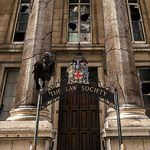Solicitors and barristers in London and across the UK have agreed to boycott legal aids cases from tomorrow (1 July) following ‘untenable’ further cuts of 8.75% in fees for duty solicitors.
According to a statement from the London Criminal Courts Solicitors’ Association (LCCSA), which represents criminal solicitors who practice in and around the Greater London area, its members have confirmed they will not act in legal aids cases after 1 July, ‘as it will be uneconomical to do so to a required and acceptable standard’.
If the 8.75% cut to funding is implemented, it will be the second consecutive year of such reductions and brings the total amount over a fifteen month period to 17.5%.
LCCSA president Jon Black said: ‘We have overwhelming support for this action, which regrettably is necessary as a result of the government’s intention to implement cuts and the proposed further cuts amounting to over 50% on some cases for January 2016, without carrying out the promised meaningful review. Had the government listened to our representations they would know that these cuts are not only unnecessary but dangerous. We have drafted a protocol, and firms that seek to act in breach of this are letting themselves, their professional colleagues and their clients down.’
The independent Bar in London was also represented at the meeting and confirmed they would not be undertaking any further work on cases with a Representation Order dated on or after 1 July as well as proposing a No Returns policy for all existing cases in the Crown Court from tomorrow.
The boycott has spread nationwide, with mass meetings of criminal solicitors and barristers in cities including Manchester, Leeds, Newcastle and Bradford lending their support.
Just last week Justice Secretary Michael Gove outlined his reform agenda for civil justice in a wide-ranging speech entitled: ‘What does a one nation justice policy look like?’ On the subject of legal aid, Gove called for the profession to do more pro bono work, saying ‘it is clear to me that it is fairer to ask our most successful legal professionals to contribute a little more rather than taking more in tax from someone on the minimum wage.’
Gove replaced Chris Grayling in the role as part of Prime Minister David Cameron’s post-election reshuffle while Gibson, Dunn & Crutcher partner, Lord Falconer, was named as the Labour Party’s opposition spokesperson for the ministry. Gove became only the second non-lawyer to take on the role of Lord Chancellor in modern times.
kathryn.mccann@legalease.co.uk











